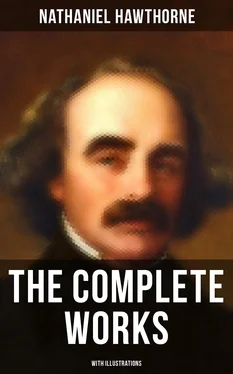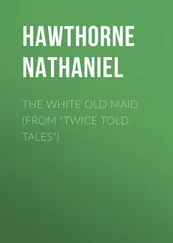The grounds for supposing that this man was in any way connected with the angler were, perhaps, very slight; yet, in the perplexity of the whole affair, they induced Edward to resolve to get at the heart of his mystery. To attain this end, he took the most direct method, — by applying to the man himself.
He had now retired apart from the throng and bustle of the village, and was seated upon a condemned boat, that was drawn up to rot upon the banks of the river. His arms were folded, and his hat drawn over his brows. The lower part of his face, which alone was visible, evinced gloom and depression, as did also the deep sighs, which, because he thought no one was near him, he did not attempt to restrain.
“Friend, I must speak with you,” said Edward Walcott, laying his hand upon his shoulder, after contemplating the man a moment, himself unseen.
He started at once from his abstraction and his seat, apparently expecting violence, and prepared to resist it; but, perceiving the youthful and solitary intruder upon his privacy, he composed his features with much quickness.
“What would you with me?” he asked.
“They tarry long, — or you have kept a careless watch,” said Edward, speaking at a venture.
For a moment, there seemed a probability of obtaining such a reply to this observation as the youth had intended to elicit. If any trust could be put in the language of the stranger’s countenance, a set of words different from those to which he subsequently gave utterance had risen to his lips. But he seemed naturally slow of speech; and this defect was now, as is frequently the case, advantageous in giving him space for reflection.
“Look you, youngster: crack no jokes on me,” he at length said, contemptuously. “Away! back whence you came, or” — And he slightly waved a small rattan that he held in his right hand.
Edward’s eyes sparkled, and his color rose. “You must change this tone, fellow, and that speedily,” he observed. “I order you to lower your hand, and answer the questions that I shall put to you.”
The man gazed dubiously at him, but finally adopted a more conciliatory mode of speech.
“Well, master; and what is your business with me?” he inquired. “I am a boatman out of employ. Any commands in my line?”
“Pshaw! I know you, my good friend, and you cannot deceive me,” replied Edward Walcott. “We are private here,” he continued, looking around. “I have no desire or intention to do you harm; and, if you act according to my directions, you shall have no cause to repent it.”
“And what if I refuse to put myself under your orders?” inquired the man.
“You are but a young captain for such an old hulk as mine.”
“The ill consequences of a refusal would all be on your own side,” replied Edward. “I shall, in that case, deliver you up to justice: if I have not the means of capturing you myself,” he continued, observing the seaman’s eye to wander rather scornfully over his youthful and slender figure, “there are hundreds within call whom it will be in vain to resist. Besides, it requires little strength to use this,” he added, laying his hand on a pistol.
“If that were all, I could suit you there, my lad,” muttered the stranger. He continued aloud, “Well, what is your will with me? D — — d ungenteel treatment this! But put your questions; and, to oblige you, I may answer them, — if so be that I know anything of the matter.”
“You will do wisely,” observed the young man. “And now to business. What reason have you to suppose that the persons for whom you watch are not already beyond the village?” The seaman paused long before he answered, and gazed earnestly at Edward, apparently endeavoring to ascertain from his countenance the amount of his knowledge. This he probably overrated, but, nevertheless, hazarded a falsehood.
“I doubt not they passed before midnight,” he said. “I warrant you they are many a league towards the seacoast, ere this.”
“You have kept watch, then, since midnight?” asked Edward.
“Ay, that have I! And a dark and rough one it was,” answered the stranger.
“And you are certain that, if they passed at all, it must have been before that hour?”
“I kept my walk across the road till the village was all astir,” said the seaman. “They could not have missed me. So, you see, your best way is to give chase; for they have a long start of you, and you have no time to lose.”
“Your information is sufficient, my good friend,” said Edward, with a smile. “I have reason to know that they did not commence their flight before midnight. You have made it evident that they have not passed since: ergo, they have not passed at all, — an indisputable syllogism. And now will I retrace my footsteps.”
“Stay, young man,” said the stranger, placing himself full in Edward’s way as he was about to hasten to the inn. “You have drawn me in to betray my comrade; but, before you leave this place, you must answer a question or two of mine. Do you mean to take the law with you? or will you right your wrongs, if you have any, with your own right hand?”
“It is my intention to take the latter method. But, if I choose the former, what then?” demanded Edward. “Nay, nothing: only you or I might not have gone hence alive,” replied the stranger. “But as you say he shall have fair play” —
“On my word, friend,” interrupted the young man, “I fear your intelligence has come too late to do either good or harm. Look towards the inn: my companions are getting to horse, and, my life on it, they know whither to ride.”
So saying, he hastened away, followed by the stranger. It was indeed evident that news of some kind or other had reached the village. The people were gathered in groups, conversing eagerly; and the pale cheeks, uplifted eyebrows, and outspread hands of some of the female sex filled Edward’s mind with undefined but intolerable apprehensions. He forced his way to Dr. Melmoth, who had just mounted, and, seizing his bridle, peremptorily demanded if he knew aught of Ellen Langton.
Table of Contents
“Full many a miserable year hath passed:
She knows him as one dead, or worse than dead:
And many a change her varied life hath known;
But her heart none.”
MATURIN.
Since her interview with the angler, which was interrupted by the appearance of Fanshawe, Ellen Langton’s hitherto calm and peaceful mind had been in a state of insufferable doubt and dismay. She was imperatively called upon — at least, she so conceived — to break through the rules which nature and education impose upon her sex, to quit the protection of those whose desire for her welfare was true and strong, and to trust herself, for what purpose she scarcely knew, to a stranger, from whom the instinctive purity of her mind would involuntarily have shrunk, under whatever circumstances she had met him. The letter which she had received from the hands of the angler had seemed to her inexperience to prove beyond a doubt that the bearer was the friend of her father, and authorized by him, if her duty and affection were stronger than her fears, to guide her to his retreat. The letter spoke vaguely of losses and misfortunes, and of a necessity for concealment on her father’s part, and secrecy on hers; and, to the credit of Ellen’s not very romantic understanding, it must be acknowledged that the mystery of the plot had nearly prevented its success. She did not, indeed, doubt that the letter was from her father’s hand; for every line and stroke, and even many of its phrases, were familiar to her. Her apprehension was, that his misfortunes, of what nature soever they were, had affected his intellect, and that, under such an influence, he had commanded her to take a step which nothing less than such a command could justify. Ellen did not, however, remain long in this opinion; for when she reperused the letter, and considered the firm, regular characters, and the style, — calm and cold, even in requesting such a sacrifice, — she felt that there was nothing like insanity here. In fine, she came gradually to the belief that there were strong reasons, though incomprehensible by her, for the secrecy that her father had enjoined.
Читать дальше












